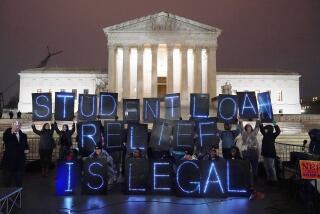New York coronavirus relief order may disrupt investment, financial contracts
- Share via
A New York directive ordering banks to help cushion the economy by providing temporary relief on mortgages and loans is so sweeping that it may unintentionally roil markets and pose risks to the financial system.
The executive order signed on Saturday by New York Gov. Andrew Cuomo requires banks regulated by the state’s Department of Financial Services to provide 90 days of forbearance to “any person or business who has a financial hardship as a result of the COVID-19 pandemic,” and it contains a specific provision for mortgage relief. That should help homeowners and small businesses struggling to make payments as their revenue plummets.
But, according to Freshfields Bruckhaus Deringer, a law firm that advises several large banks, the order also applies to business beyond what the governor explicitly has targeted. The order should have contained an exclusion for qualified financial contracts, a class of agreements between banks and investors or so-called end users, Freshfields partners Brian Rance and Jerome Ranawake said in an interview. Some examples of those contracts are bond-repurchase agreements, margin loans and derivative trades such as hedges against price movements.
“The first business day after the order was signed, New York-supervised banks were already being met with threats of litigation if they closed out in violation of the order.”
— Brian Rance, partner, Freshfields Bruckhaus Deringer
A regulation from the Financial Services Department is expected to codify the order and may bring clarity as soon as this week, according to one bank executive briefed on the matter. But the order is already being used against efforts to close out trades, the lawyers said.
“This creates rather than reduces financial risk,” Rance said. “Yesterday, the first business day after the order was signed, New York-supervised banks were already being met with threats of litigation if they closed out in violation of the order.”
Spokespeople for the state department and the governor’s office didn’t immediately respond to requests for comment.
Firms affected by the order include subsidiaries of major foreign banks such as Deutsche Bank AG and Barclays Plc. They are effectively barred from exercising rights such as demanding collateral or closing out trades, exposing them to significant market and counterparty risk with no recourse for 90 days, Rance said. And if the asset prices keep falling and spreads keep widening, that could translate into losses, eroding bank capital and potentially creating knock-on risks at a systemic level.
He and Ranawake estimated the notional value of contracts affected by Cuomo’s order in the hundreds of billions of dollars.
One additional issue is that the order applies only to financial institutions that are regulated by New York state. As a result, federally chartered banks, such as JPMorgan Chase & Co. or Citigroup Inc., that aren’t subject to the order may now have an advantage when competing for trading business.
The largest U.S. banks “will be able to continue to control counterparty risk,” Rance said. “That’ll reduce competition and raise the cost of entering into these trades for others.”
More to Read
Inside the business of entertainment
The Wide Shot brings you news, analysis and insights on everything from streaming wars to production — and what it all means for the future.
You may occasionally receive promotional content from the Los Angeles Times.










